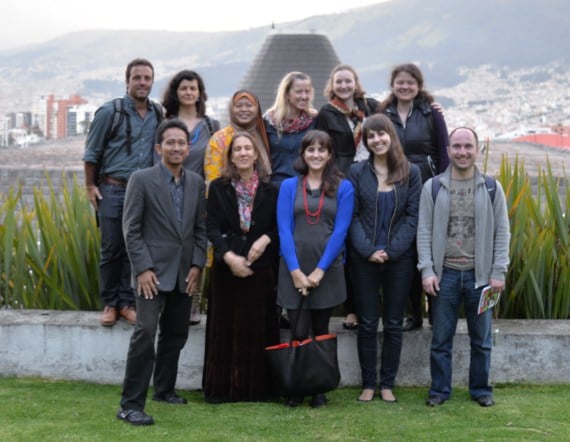Wednesday April 8 was a change of scenery and pace for the teams.
The previous day, day two of the exchange, each team had worked on their own project.
This day, Grupo FARO, in collaboration with Universidad Andina Simón Bolívar, hosted a public event “Collaboration between think tanks and universities” that invited different actors of the knowledge sector in Ecuador and the On Think Tanks Exchange participants, donors and organizers to reflect on the importance of collaboration and the ways in which it can be promoted.
The meeting had approximately 50 participants (students and teachers from different universities, civil society organizations leaders, public servants, academics and researchers in Ecuador and all the Exchange participants donors and organizers) and generated an interesting exchange of ideas and points of views on collaboration and knowledge production.
There presentations include:
Orazio Bellettini’s presentation on knowledge in the 21st Century:
Adriana Arellano on Más Saber América Latina -a project which studies the links between think tanks and universities in Latin America:
Some interesting ideas discussed include:
- In the system of knowledge production, there are new emerging countries such as China that has managed to produce more knowledge through increased collaboration.
- How can we promote a culture of collaboration, research, intellectual generosity? Quality education, reading habits, logical thinking are key.
- Universities focus on theoretical research, think tanks on public policy-applied research. Collaboration between these institutions can help to take great theoretical ideas into practice.
- Research does not equal indexed articles. Few people read these documents. The publication of indexed articles is one channel of dissemination, targeting one audience. Other channels and formats shouldn’t be neglected.
- Think tanks can be the translators of the knowledge generated by universities and other actors.
- Collaboration starts with people, not necessarily with the institutions.
After this rich debate On Think Tanks Exchange participants regrouped and reflected on the next steps of the initiative and how a second phase of the Exchange could be implemented, and improved. Participants emphasized the importance of developing a personal relationship between each other and the natural way in which projects concentrated around collaboration on organizational development issues. Some of the recommendations include:
- Involving experts in order to strengthen the process of learning so that it goes beyond learning from our peers.
- Building upon relationships already made and continuing with new collaborations that could focus in organizational development issues as well as around policy issues.
- Maintaining a strong initial phase of participant selection to assure the professionalism and commitment of participants that makes this experience productive and fun.
- Promoting more inter-group exchange so that the three teams learn more from the projects of others.
After this reflection and a late lunch we all headed to the Museo Capilla del Hombre to learn more about the work and vision of the Ecuadorian painter and sculptor Oswaldo Guayasamín.



 Previous
Previous
